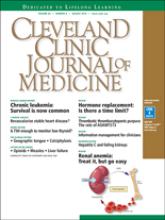ABSTRACT
Although still in their infancy, biologic therapies for hematologic cancers are making rapid strides, diminishing the role of chemotherapy and offering long-term remission. More patients are surviving cancer and therefore are increasingly being seen by primary care physicians, who must be aware of complications of standard and newer treatments and how to manage them.
Footnotes
Medical Grand Rounds articles are based on edited transcripts from Medicine Grand Rounds presentations at Cleveland Clinic. They are approved by the author but are not peer-reviewed.
- Copyright © 2016 The Cleveland Clinic Foundation. All Rights Reserved.
- Matt Kalaycio, MD, FACP⇑
- Chairman, Department of Hematology and Medical Oncology, and Staff, Transplantation Center and Department of Cancer Biology, Taussig Cancer Center, Cleveland Clinic
- Professor, Cleveland Clinic Lerner College of Medicine of Case Western Reserve University, Cleveland, OH
- ADDRESS:
Matt Kalaycio, MD, Department of Hematology and Oncology, R32, Cleveland Clinic, 9500 Euclid Avenue, Cleveland, OH 44195; kalaycm{at}ccf.org
ABSTRACT
Although still in their infancy, biologic therapies for hematologic cancers are making rapid strides, diminishing the role of chemotherapy and offering long-term remission. More patients are surviving cancer and therefore are increasingly being seen by primary care physicians, who must be aware of complications of standard and newer treatments and how to manage them.
Footnotes
Medical Grand Rounds articles are based on edited transcripts from Medicine Grand Rounds presentations at Cleveland Clinic. They are approved by the author but are not peer-reviewed.
- Copyright © 2016 The Cleveland Clinic Foundation. All Rights Reserved.






